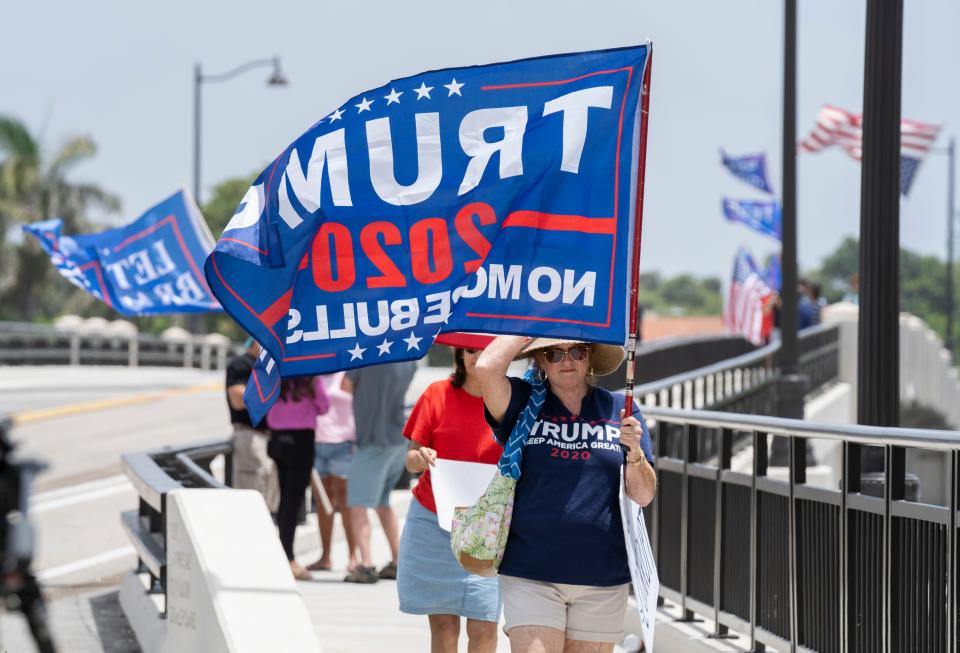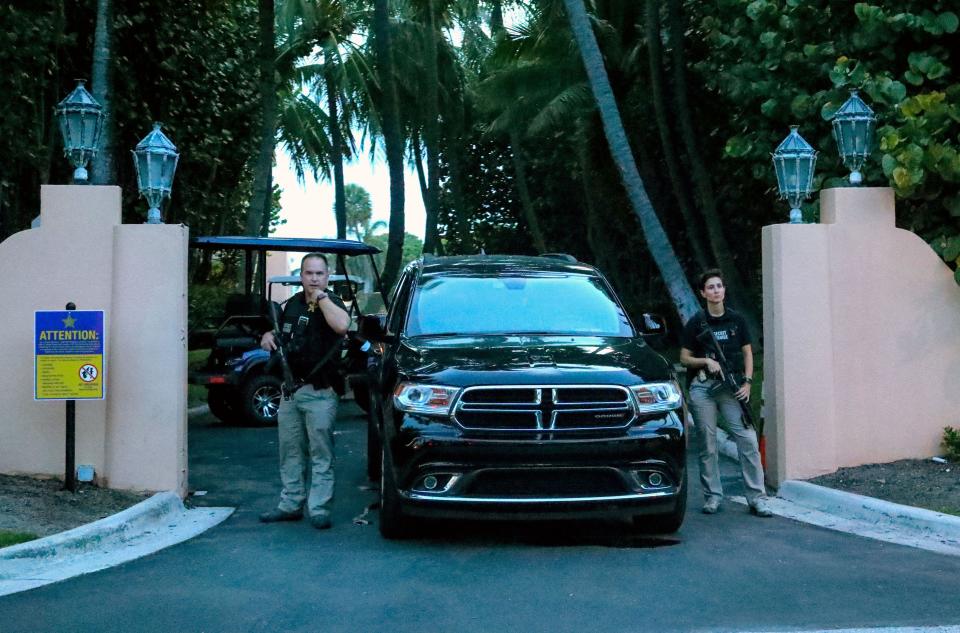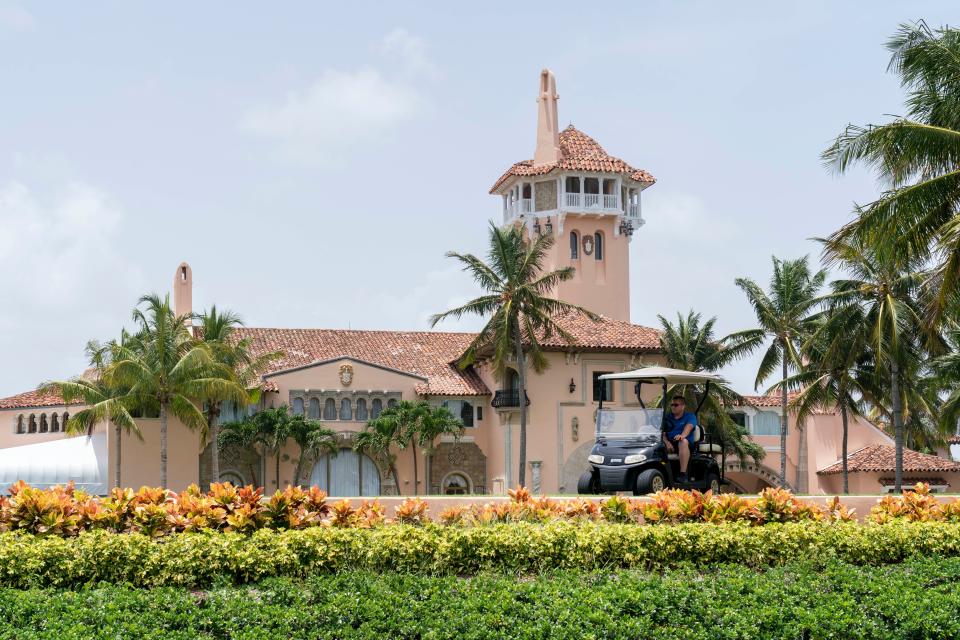Donald Trump knows what FBI agents took from Mar-a-Lago and why they took it, experts say
Former President Donald Trump knows what FBI agents took from his private club in Palm Beach and knows why they took it, former federal prosecutors said Tuesday.
Before leaving Mar-a-Lago on Monday after executing a search, FBI agents were legally required to leave behind the search warrant and an inventory listing what items were seized, said Fort Lauderdale defense attorney Richard Serafini, who spent 10 years working as a federal prosecutor.
In addition to revealing what agents grabbed, the search warrant would have listed what crimes agents believed may have been committed that prompted their unprecedented request to search the home of a past president, said former federal prosecutor David Weinstein.
Trump in New York when Mar-a-Lago raided by FBI
Trump, who was in New York when agents descended on Mar-a-Lago, has blasted federal officials, claiming the search is yet the latest and most egregious example of his ongoing political persecution.
Scene at Mar-a-Lago: Trump loyalists descend on Mar-a-Lago as news breaks of FBI search
VIDEO: See replay: After FBI search, supporters with signs, loud music cruise past Mar-A-Lago
“It is prosecutorial misconduct, the weaponization of the Justice System, and an attack by Radical Left Democrats who desperately don’t want me to run for President in 2024,” Trump said in a lengthy statement he posted online shortly after Monday’s raid.
Trump could release documents to the public, attorney says
U.S. Rep. Jim Jordan, the ranking Republican on the House Judiciary Committee, joined Trump's chorus on Tuesday. During an interview on Fox News, Jordan demanded that Attorney General Merrick Garland and FBI Director Christopher Wray explain their actions.
“What was on the warrant? What were you really doing? What were you looking for?" he asked. "Why not talk to President Trump and have him give the information you’re after?"
But, Weinstein said, if Trump wants to fight back in the court of public opinion, the agents gave him powerful ammunition.
If the documents agents left behind indicate they found little of importance, Trump could release them to the public, said Weinstein, a Miami defense attorney.
The silence from Trump and his attorneys could mean agents alerted them that the former president is suspected of far more serious crimes than simply not turning over presidential records to the National Archives and Records Administration.
Reaction to search of Trump's Mar-a-Lago: Anger from supporters, caution from critics
Search theories: Why did the FBI search Trump's Mar-a-Lago estate? 5 potential explanations

“If all it says is the Presidential Records Act, they would be waving it around like the American flag,” said Weinstein, who left the South Florida U.S. Attorney’s Office a decade ago after serving as chief of the national security section.
While he acknowledged that he has no inside knowledge of what prompted agents to get the warrant, he said he suspects Trump may be under investigation for mishandling classified documents.
Weinstein compared the charges Trump could face to those filed against former U.S. Army soldier Chelsea Manning. Manning was convicted in 2013 of violating the Espionage Act and other laws by disclosing thousands of classified and sensitive military and diplomatic documents to WikiLeaks. Her 35-year sentence was commuted to seven years in 2017 by President Barack Obama.
Like Weinstein, Serafini said Trump could use the documents the FBI left at Mar-a-Lago to shore up his initial statements that he was being unfairly targeted.
“I do understand when the FBI agents show up there’s a fog of war attitude when you’re deciding what action to take,” he said. “But if you’re going to make a statement publicly, you would like to have something to back it up.”
Further, he said, the search seems to be heavy-handed, particularly since the National Archives in January removed 15 boxes of presidential records from Mar-a-Lago.
“But, if you had evidence someone was about to destroy the documents, it becomes a much more important issue,” Serafini said.

Probable cause affidavit FBI prepared is key to reason for search warrant
While a spokesman for Trump didn’t return a message for comment, a Trump lawyer told the Washington Post that agents removed about 12 boxes from Mar-a-Lago. His lawyers declined a request to release copies of the search warrant and inventory left at the gilded mansion.
Another former prosecutor said the FBI likely gave Trump little information about what they found.
The search warrant is bare bones, said David Laufman, who headed the U.S. Justice Department’s Counterintelligence and Export Control Section before leaving in 2018. Likewise, he said, the inventory list isn't detailed.
It could say "boxes from the safe," or even just "box of papers," Weinstein agreed.
The key document, which remains under seal, is the probable cause affidavit the agents prepared to persuade a magistrate to green-light the search warrant, Laufman said. It explains the evidence FBI agents gathered to justify the request to enter Trump's estate.
The FBI declined to comment on what prompted its decision to search Trump’s private club.
Trump's lawyer told Newsweek that the warrant was signed by U.S. Magistrate Judge Bruce Reinhart, who works at the federal courthouse in downtown West Palm Beach. The former federal prosecutor and criminal defense lawyer is one of three magistrates assigned to the courthouse. Federal rules require magistrate judges to sign off on requests for search warrants.

To persuade Reinhart to give them the go-ahead, agents would have had to reveal why they had probable cause to believe a crime had been committed.
“Probable cause is a high standard,” said Richard Lubin, a veteran West Palm Beach defense attorney. “It’s not enough just to think something occurred, they have to have some solid basis for it.”
It is likely one or more people, with solid credentials and persuasive evidence, approached agents. In the probable cause affidavit agents provided to the magistrate, it is unlikely the people would be named. Instead, they would have been described as confidential informants.
However, agents would have had to explain why they believed the informants were credible and their information reliable, Serafini said.
Unlike the warrant and the inventory that was left at Mar-a-Lago, the affidavit is sealed from public view. It would remain sealed unless charges are filed.
USA Today reporter Josh Meyer contributed to this report. Meyer is a veteran correspondent focusing on domestic, national and global security issues, including terrorism, extremism, cybersecurity and transnational criminal organizations.
Jane Musgrave covers federal, civil and criminal courts for The Palm Beach Post. Contact her at jmusgrave@pbpost.com.
Getting a search warrant
David Laufman headed the Justice Department’s Counterintelligence and Export Control Section up until 2018. He supervised the investigation and prosecution of cases affecting national security, including mishandling of classified documents under the Classified Information Procedures Act. He explains the process of getting a search warrant:
A prosecutor in one of the U.S. Attorney's Offices around the country or at Main Justice (headquarters), like the National Security Division or the Criminal Division, or some combination of those, would work with the FBI.
The FBI would conduct the investigation in lockstep with the prosecutors to obtain information enabling prosecutors to exercise their prosecutorial discretion as to whether to charge somebody criminally.
If the information the government was developing in the course of the investigation matured to a point where the government decided there was probable cause that a crime had been committed, and that the evidence of that crime is likely to be found in a particular place, it applies for a warrant. ( The person targeted in the search doesn't have to be the target of the investigation. It could be some third party in possession of information or evidence that would pertain to the commission of a crime.)
The prosecutor then works with the agent to prepare a written affidavit to support a search warrant application. That would undergo review by supervisory officials at the FBI and Department of Justice.
The prosecutor and agent would then make an appointment with the judge’s chambers. Usually there is a particular magistrate judge assigned to consider search warrant applications. They would address any questions the magistrate might have. The magistrate would make a judgment on whether to approve the search warrant application.
- Josh Meyer
This article originally appeared on Palm Beach Post: FBI raided Mar-a-Lago: Trump knows what they took from search warrant

 money
money 